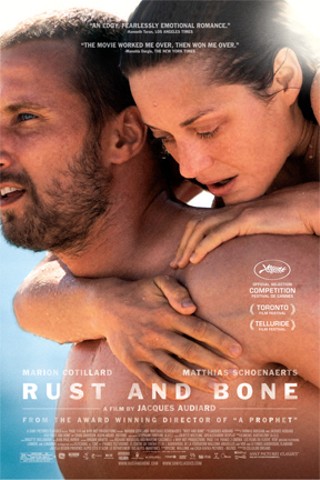After waking to find both of his legs had been amputated, Ronald Reagan screamed, "Where's the rest of me!" It was the centerpiece of the 1942 film King's Row. A couple of decades later, Reagan repeated the line as the title of his autobiography, because it was apparently the best work of his film career.
That scene, under not entirely different circumstances, is played much more effectively and unbearably by Marion Cotillard in Rust and Bone. Yes, believe it or not, Cotillard is a better actor than Ronald Reagan. And because digital effects didn't exist in 1942, they just kept the future president in bed so his legs didn't show. If you grade this kind of thing, the CGI in Rust and Bone surpasses the mere technical achievement of Lt. Dan in Forrest Gump—though great at the time—and seamlessly integrates missing legs into the film. Integrating that into the character is up to Cotillard.
She plays Stéphanie, a trainer of killer whales at a French version of SeaWorld. She also performs with the animals, with the scenes explaining what you need to know about her legs. There is sadness around Stéphanie, though. Our peek into her love life reveals a tenuous relationship with her boyfriend—whom we never see again after Stéphanie wakes up in the hospital—and there doesn't seem to be very much support from anyone else. She has one friend who pops up now and again, but mostly Stéphanie is alone and not able-bodied.
The night before her accident, she had another one. At a nightclub, Stéphanie got caught in the crossfire between a bouncer and some patrons not so gently being shown the way out. Her nose bloodied and a little woozy, Stéphanie was in no shape to drive home. Enter Ali (Matthias Schoenaerts), who has come to the south of France from Belgium looking for a better life for himself and his son. He has some amateur fighting experience and has worked security, but it's evident his past is sketchy. The same may hold true for his future.
Feeling guilty about inadvertently causing her bloody nose, Ali drives Stéphanie home and in the spirit of small talk says her outfit is a little flirty. Actually, he says she's dressed like a whore. It's hard to tell if he means it as a compliment or a come-on. Neither works. Weeks after her tragedy, Stéphanie calls Ali, presumably because there is no one left to call. He agrees to see her, presumably because there is no one left to go see.
The relationship is platonic for a while; Stéphanie can't bear that kind of emotional attachment at the moment and Ali purposely avoids it. But he takes her to the ocean one day to help her overcome her grief, and it's the first inkling that somewhere inside there, Stéphanie is still alive. It's a wonderful moment and easily the warmest in the film. It also sets the stage for a deeper relationship, one that's still more complex than perhaps either of them want it to be. They know, however, that a little distance suits them best.
Ali begins taking part in underground bare-knuckle mixed martial arts fights, and their brutality fits the raw emotion of the characters. More than anything, the fights are a metaphor for the pain life throws at both Ali and Stéphanie. Pain is something director Jacques Audiard delivers with regularity. The Beat That My Heart Skipped and Read My Lips go down some dark alleys, but nothing on the level of A Prophet, which is probably Audiard's best film and his American breakthrough. That film has the luxury of confining its characters within a prison, so metaphors aren't really needed, but Ali and Stéphanie seem just as trapped soaking up the sun on the French Riviera.
Schoenaerts is a bull in a china shop several times in Rust and Bone; even when he develops true feelings for Stéphanie, he has no idea how to truly express them. Cotillard is, of course, one of the great actors of her day. While it's easy to get caught up in the fact that she's a beautiful woman, in her best performances (here and in La Vie en Rose), that's a significant afterthought. The magnificent digital effects help round out her struggle, but given the circumstance of Stéphanie's life, the wrong performance—too much here, too little there—could send the entire film over a cliff. And from the moment she falls out of a hospital bed, you know you're not just watching someone go through the motions.
You're sucked into this shared world of sadness because you want both of them to emerge from it so badly. Audiard probably goes a step too far to let the audience know what the future holds for Stéphanie and Ali, but it's a minor offense in an otherwise well-executed and consuming movie.











